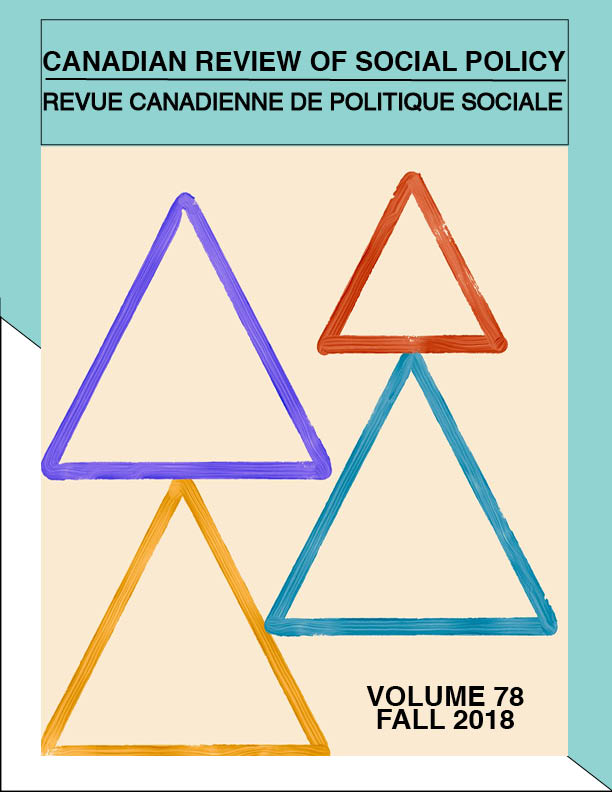Reducing Delivery by Program Recycling: An Analysis of the Poverty Reduction Strategy in Ontario, Canada
Mots-clés :
Policy analysis, poverty reduction, policy and program recyclingRésumé
The literatures on policy development and the agenda-setting power of governments often point to governments’ ability to strategically use in-place programming to supplement existing policy, although this type of policy or program recycling is rarely discussed as a standalone type of strategic policy development. Yet, governments often credit-claim based on the appearance of a robust set of programming that is, in fact, a cobbled together pastiche of new initiatives and existing programming – often emphasizing its novelty, but relying on existing programs and budget measures to deliver. The benefit to governments is obvious: policymakers are able to appear innovative and committed to solving a policy problem while keeping budget costs down. In this article, we present this phenomenon – “policy and program recycling” – as a unique way in which governments develop policy while foregoing new programming or resources. In doing so, we set out several concrete indicators that empirically identify cases of policy and program recycling across policy sub-fields, suggesting both its costs and benefits and discussing how this behaviour can affect citizens’ use of programs. Our theoretical argument is empirically supported through a study of the Poverty Reduction Strategy in Ontario, Canada – an example of program recycling that impacts Ontario’s most vulnerable citizens.
Résumé
La littérature au sujet de l’élaboration des politiques et du pouvoir d’influence des gouvernements souligne souvent la manière stratégique dont les gouvernements utilisent des programmes déjà établis pour compléter les politiques existantes. Cela dit, ce genre de politique ou de recyclage des programmes est rarement mentionné comme une stratégie distincte d’élaboration des politiques. Pourtant, les demandes de crédit des gouvernements sont fondées sur un ensemble de planification, en apparence solide, qui est en fait un pastiche enchevêtré de nouvelles initiatives et de programmes existants. Bien qu’on souligne son caractère novateur, sa réalisation dépend des programmes et des mesures budgétaires existantes. Évidemment, cela bénéficie aux gouvernements, car les responsables politiques paraissent novateurs et déterminés à résoudre les problèmes politiques sans affecter les coûts budgétaires. Dans cet article, nous présentons le phénomène de « recyclage des politiques et des programmes » comme un concept unique par lequel les gouvernements développement des politiques tout en précédant des planifications ou des ressources nouvelles. Ce faisant, nous avons établi plusieurs indicateurs concrets qui identifient de manière empirique des cas de recyclage des politiques et des programmes dans différents sous-domaines de la politique. Nous indiquons ses coûts et ses avantages et nous discutons de la manière dont ce comportement peut affecter l’utilisation des programmes par les citoyens. Nous appuyons notre argument par les données empiriques d’une étude sur la stratégie de réduction de la pauvreté en Ontario (Canada), un exemple de recyclage de programme qui affecte les Ontariens les plus vulnérables.
Mots clés: Analyse des politiques; réduction de la pauvreté; recyclage des politiques et des programmes
Téléchargements
Publié-e
Comment citer
Numéro
Rubrique
Licence
1-The author guarantees that the manuscript is an original work not published elsewhere in print or electronically in whole or in part, except in abstract form, that the author has the full power to make this contribution, and that the manuscript contains no matter libelous or otherwise unlawful or which invades the right of privacy or which infringes any proprietary right.
2-The author guarantees that the manuscript has not been previously published in print or electronically and that if the manuscript contains any tables, figures or images fully reproduced or closely adapted from previously published material, the author must obtain the necessary permission from the author/publisher holding the original copyright prior to publication in CRSP. The author may be required to produce evidence of permission granted to CRSP’s editors.
3-As a condition of publication in CRSP, the author assigns all copyright to CRSP, including but not limited to the right to publish, republish, and otherwise distribute this manuscript in print, electronic, or other formats. As CRSP is a non-profit interdisciplinary scholarly journal, the author will receive no royalty or other monetary compensation for the assignment set forth in this agreement.
For the purpose of full disclosure, CRSP will not normally use the content provided by the author in a commercial venture, but for the purpose of disseminating the author’s content to as many readers as possible. For distribution, third parties engaging in commercial activities may be contracted to distribute the content globally, and such parties may make a profit out of the author’s content in their normal course of business. CRSP will not pay the author or reimburse the author in any form based on such commercial activities because the conduct of such commercial activities is outside the control of CRSP.
Any future reference to or use of this published material by the authors must acknowledge CRSP as the original place of publication.
PERMISSION REQUEST/ARCHIVING
Permission is given to author(s) receiving funding via Tri-Council Agencies, the Canadian Institutes of Health Research (CIHR), the Natural Sciences and Engineering Research Council of Canada (NSERC) and the Social Sciences and Humanities Research Council (SSHRC), to make their publications freely available in an Open Access repository within the stated deadline by the Tri-Council Agencies (12 months following publication). Archiving of publication must be a manuscript copy bearing none of the CRSP headers, footers or any other distinguishing marks. No links to the article on the CRSP website is permitted.
Permission requests from third parties to reproduce articles in part or full in academic/educational publications can be directed to the managing editor of CRSP, and will not be unreasonably denied.

